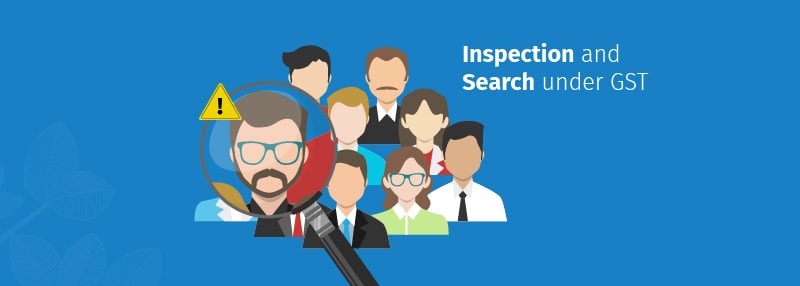Inspection and Search under GST are conducted as per the provisions laid down in the GST law. Let us understand them one by one.
Inspection under GST
A Joint Commissioner (or any officer of a higher rank), may conduct an inspection under GST, only via written authorization, if they have reasons to believe that a taxable person has done any of the following, in order to evade tax:
- Suppressed any transaction of supply
- Suppressed stock in hand
- Claimed input tax credit in excess
- Violated any of the provisions
- Kept goods which have escaped payment of tax
- Kept accounts and / or goods in such a way as to evade tax
Now, if you read the section above, you will come across a phrase “reasons to believeâ€. What do we mean by “reasons to believe†under the GST provisions? As per the GST rules, “reason to believe†means, having knowledge of facts, that would make any reasonable person, knowing the same facts, to reasonably conclude the same thing. As per the Indian Penal Code, a person is said to have “reason to believe†a thing, if he has sufficient cause to believe that thing but not otherwise. This will be something that will be based on examination and evaluation, and not on something which is an opinion. In short, “reasons to believe†will be based on facts rather than interpretation of facts. Also, this should be something, which should not be mentioned in writing at any stage. In fact, as per the GST rules, “reasons to believe†shall not be disclosed to any person or any authority or the Appellate Tribunal.
In any case, once the Joint Commissioner (or any officer of a higher rank) is clear that action has to be taken, he can then authorize any officer via Form GST INS-01 to inspect places of businesses, belonging to the following entities:
- Taxable person
- Transporter
- Owner or Operator of the Warehouse
- Any other place, as deemed fit
Search under GST
On the face of it, “Search†and “Inspection†may sound like the same activity. Hence, before understanding the provisions for Search under GST, it is important to understand the difference between Inspection and Search in GST.
| Search under GST | Inspection under GST |
| Involves an attempt to find something. Search is an action of a government official (a tax officer or a police officer, depending on the case) to go and look through or carefully examine a place, person, object etc. in order to find something concealed or to discover evidence of a crime. The search of a person, or vehicle or premises, can only be done under the proper and valid authority of law. | Is the act of examining something, often closely. Inspection under GST is a softer provision than search. It enables officers to access any place of business of a taxable person and also any place of business of a person engaged in transporting goods or who is an owner or operator of a warehouse or godown. |
On the basis of results emerging from inspection or any other reason, the Joint Commissioner (or any officer of a higher rank) can order for a search, via written authorization, if he has reasons to believe that the following exist:
- Goods which are liable for confiscation
- Documents or Books or other things which will be useful during proceedings and are hidden somewhere
Based on his conclusions, the Joint Commissioner (or any officer of a higher rank) can, either on his own or through an authorized officer, follow the provisions of inspection and search under GST and seize the goods and documents. However care should be taken to record materials and relevant information, before the issue of the search warrant or before conducting the search.
